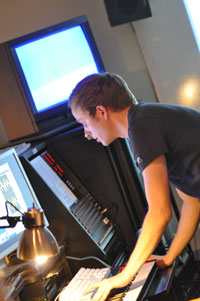
Photo by Phil Farnsworth
Andreas Bjorck
Position
Associate Professor
Affiliated Departments
Telephone
617-747-8142
For media inquiries, please contact Media Relations
Career Highlights
- Staff composer, sound designer and engineer at Verité Music Productions
- Scored the PBS/NOVA documentaries Car of the Future and The Great Robot Race
- Scored independent documentary There Ought to Be a Law and award-winning short Olyver Brody
- Produced Murmurs, debut album of indie electronic artist Caroline
- Produced tracks with Laura DiStasi and Andrew Chaikin, a.k.a Kid Beyond
Awards
- Orchestrator, music editor and sound designer on The Nazi Officer’s Wife (Best Music Emmy nominee); Omar & Pete (Best Documentary Emmy nominee); Rx for Survival (Best Informational Programming Emmy winner)
In Their Own Words
